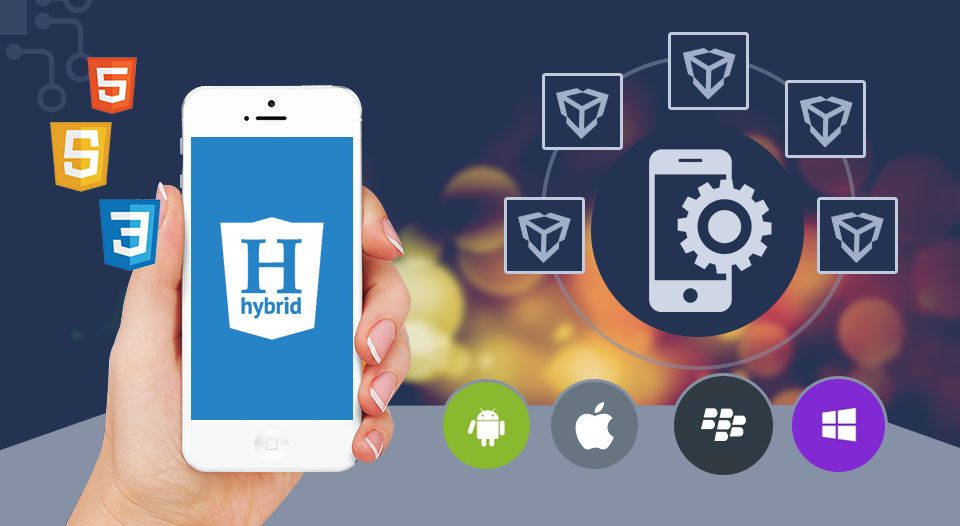9 Distinct Advantages of Hybrid Mobile App Frameworks

Hybrid Mobile App Development is all the buzz in development circles because of the numerous benefits this style can provide.
Instead of creating a desktop or mobile-specific app, a hybrid app is designed to work across all platforms.
Before we delve into the benefits its worth considering the distinct differences between the two approaches.
Whereas a native app (designed for one platform only) on a desktop will constantly remain connected to all of your files and other users features to maximize performance.
A hybrid app will utilize the normal functions of the native app but then work specifically with mobile qualities such as browser view and interfaces, enabled by cross-platform APIs.
Check out the nine of the distinct benefits brought by hybrid Mobile App
1. The cost of development
Quite simply, hybrid frameworks which support hybrid apps are more cost-effective than developing native apps separately for obvious reasons: you have one framework which can support everything that you are trying to achieve.
2. Speed
Not only do the hybrid frameworks, as mentioned above, promote cost efficiency, they are also intrinsically linked to the speed of development.
Quite simply, if you are developing one framework instead of two, then the speed of which that framework can be developed and the app can be supported it therefore increased.
It’s simple math.
3. Creativity
It’s possible to get more creative with hybrid apps than it would be with ordinary native apps because of what the user experience functionality allows.
‘The fact is, hybrid development opens up possibilities through the interaction of the interfaces that would normally be utilized for either of the native apps.
The result is better user experience, which is great news for developers,” says Michael Freud, a web developer at PHDKingdom and AcademicBrits.
4. Attractive user interfaces
A hybrid app allows for a style and response of the user interface that native apps are just not capable of providing.
App ratings and placement in app stores are deeply linked to the user experience, of which the interface and related functionality if of course the most obvious example of how user experience manifests.
“Hybrid functionality is simply better than what native apps can provide due to the interconnectivity of the desktop and mobile functionalities built upon one framework,” says Tessa Buckingham, a tech writer at Australia2Write and NextCoursework.
5. Integration
Native apps will only run on the same operating system, which is fine to begin but what about if you want to start integrating with other apps which run on different systems?
Hybrid frameworks don’t have this problem because of the fact they are built with this purpose in mind. That is a distinct advantage.
6. Offline support
This is clearly one feature that just does not exist with a native app, and the benefits are clear to anyone who has a limited data plan, for example, or who has connectivity issues for one reason or another.
Quite simply hybrid apps can appeal to a populous that native frameworks cannot reach alone, and therefore you are in a position where two frameworks are then required, which takes you back to limitations on cost and speed of development.
7. Multi-platform availability
Your hybrid app, by the very nature of its design, will most likely be supported by all major mobile app company and app developers and also be compatible with the frequent updates that are part and parcel of modern tech. That is a winning combination.
8. PM methodologies
Developing an app is a project, of course, and there are many styles of methodologies that development teams can utilize in their approach.
Two of the most common are the Waterfall and Agile approaches.
Agile, as the name would suggest, enables milestones and the end product to evolve somewhat during the development process, while Waterfall would traditionally be a little more restrictive in its approach in that a milestone can only begin when the previous one has been completed, so can lead to delays in the development stage if there is a hold up at one critical juncture.
The benefit here is that hybrid development can use a blend of these approaches because it enables planning before the development begins but can also see the development process cut into shorter milestones which can ensure delivery comes in stages, and there are fewer holdups on the way to the final result.
9. Appeal to the marketplace
Not only will hybrid apps appeal more to the target demographic through all of the benefits that have already been listed, but they also qualify in the eyes of those who disseminate the apps to the populace: namely Google Play Store and the Apple Store.
If your app is a winner in the opinion of these two dominant forces in the marketplace, then your reach as an app is widened to the best possible degree.
Google and Apple love hybrid apps because of all the functional benefits that we have already discussed here, and the result is an app which is widely available and likely to be picked up by users.
Conclusion
In a crowded and ultra-competitive marketplace for mobile apps, any functions that make the user experience smoother and, in some ways, more akin to a desktop app, will set you app apart and allow it to jockey for position towards the front of the mobile app line.




